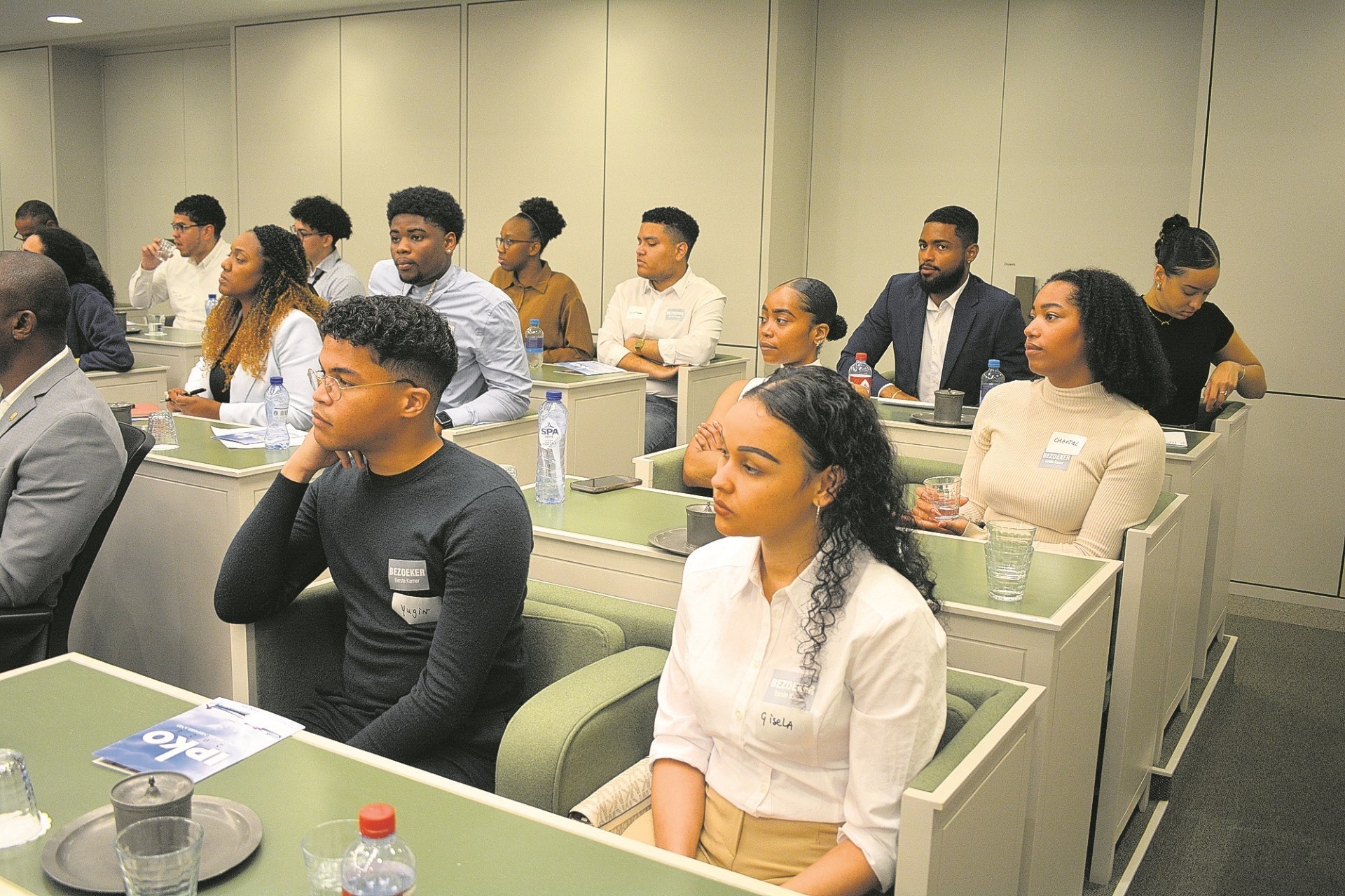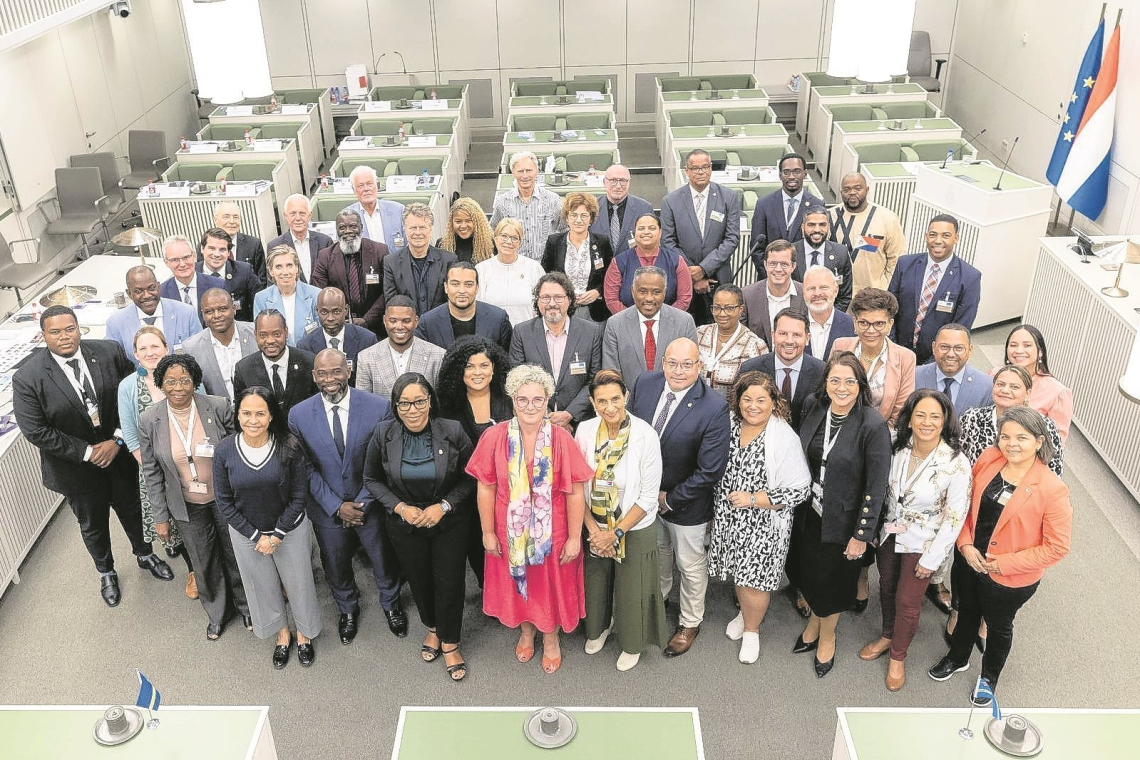Group photo
~ “If there is a will, there is a way” ~
THE HAGUE--Representatives of the Parliaments of the Netherlands, Curaçao, Aruba and St. Maarten believe that democracy can be restored in the Kingdom of the Netherlands if the countries actively work together to solve the issue.
During the Inter-Parliamentary Kingdom Consultation IPKO, parliament members of the four countries acknowledged the existence of the so-called democratic deficit in the kingdom, in which the Netherlands is believed to have more political power than the other three autonomous countries.
 Dutch Caribbean students were also invitedIt was decided that, in an attempt to solve this problem, a diverse group of independent experts commissioned by IPKO will examine various solutions to reduce the democratic deficit in the Kingdom of the Netherlands.
Dutch Caribbean students were also invitedIt was decided that, in an attempt to solve this problem, a diverse group of independent experts commissioned by IPKO will examine various solutions to reduce the democratic deficit in the Kingdom of the Netherlands.
“The requested experts must map out, analyse (pros and cons for those involved), and summarise existing and new proposals to reduce the democratic deficit in the Kingdom. They should also consider and analyse the scope and meaning of existing statutory provisions (including Articles 3, 11, 26, 27, 38, 43, and 51),” it was stated in the agreements signed, Monday, June 10, on the last day of the semi-annual meeting.
The democratic deficit has been extensively discussed during the IPKO, like many years before. Although it is often discussed, not much has been done to reduce the deficit. For example, the recommendations made by the Brooks Commission in 2009 at the request of the IPKO have never been followed up.
At the closing press conference on Monday, representatives of the four countries looked back at a successful IPKO during which important steps have been made to reduce the deficit.
“After 70 years of the Charter [of the Kingdom of the Netherlands – Ed.], it is about time [to solve the democratic deficit – Ed.],” said Paul Rosenmöller, chairman of the Senate committee for Kingdom Relations. When asked whether he believes that democracy in the Kingdom can be restored, he said the Dutch delegation believes that it is possible. “So far we have not succeeded, but we have now said we are going to revive this discussion. Where there is a will, there is a way, and we have to find it – that is the only way out.”
St. Maarten Parliament President Sarah Wescot-Williams (DP) shares his sentiment. “I share my colleague's positivism – I, too, believe it is possible. She added that, although she is aware of previous reports on the democratic deficit, she is happy that the recommendations made in these reports will be looked into and that experts will provide an overview of possible concrete actions.
However, she insisted, it is of the utmost importance to set clear deadlines and to hold each other accountable. “We have to decide what action will be taken, and if we don’t stick to the deadlines, we’ll be talking about the same issues in five years.”
Prior to IPKO, the delegations of Curaçao, Aruba and St. Maarten agreed to finalise the long-awaited draft Dispute Regulation by the end of the year. Wescot-Williams referred to this
agreement as a way to decrease the democratic deficit in itself. It shows that “if we work together and push forward, we can make a difference,” she said.
Member of Curaçao’s Parliament Fergino Brownbill said he supports Rosenmöller’s and Wescot-Williams’ views. “I see the end of this IPKO as a call for action,” he said. “With this agreement, we acknowledge the fact that there is a democratic deficit and that we must take action to solve it.”
The possibility of holding an inter-parliamentary conference dedicated to addressing the Kingdom's democratic deficit by 2025 at the latest will also be explored, using the expert report as a starting point. Additionally, the Kingdom government is expected to clarify as soon as possible whether a Kingdom conference will be organised, with potential participation from parliamentary representatives.
The democratic deficit was clearly evident last week during the parliamentary debate on the tax treaty that Curaçao would like to establish with Malta. Although the treaty complies with strict international standards, according to Caretaker Minister of Foreign Affairs Hanke Bruins Slot and State Secretary of Finance Marnix Van Rij, the prospective coalition partners NSC and VVD are not willing to agree to ratification of the treaty without a fight. The Second Chamber of the Dutch Parliament will discuss the treaty today, Tuesday.







